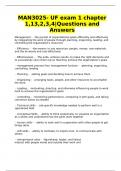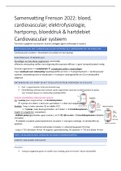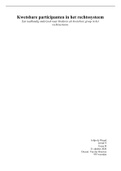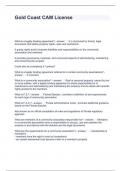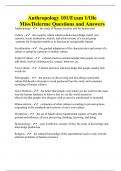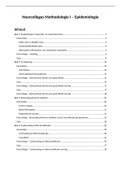MAN3025- UF exam 1 chapter
1,13,2,3,4|Questions and
Answers
Management - -the pursuit of organizational goals efficiently and effectively
by integrating the work of people through planning, organizing, leading, and
controlling the organization's resources
- Efficiency - -the means- to use resources- people, money, raw materials,
and the lie wisely and cost-effectively
- Effectiveness - -The ends- achieve results, to make the right decisions and
to successfully carry them out so that they achieve the organization's goals
- management process/ four management fuctions - -planning, organizing,
controlling, leading
- Planning - -setting goals and deciding how to achieve them
- Organizing - -arranging tasks, people, and other resources to accomplish
the work.
- Leading - -motivating, directing, and otherwise influencing people to work
hard to achieve the organization's goals
- controlling - -monitoring performance, comparing it with goals, and taking
corrective action as needed
- Technical skills - -job-specific knowledge needed to perform well in a
specialized field
- conceptual Skills - -ability to think analytically, to visualize an organization
as a whole and understand how the parts work together
- human skills - -ability to work well in cooperation with other people to get
things done
- soft skills - -ability to motivate, to inspire trust, to communicate with
others
- interpersonal roles - -figurehead, leader, and liaison
interact with people inside and outside their work unit
, figurehead-show visitors around your company, attend employee birthday
parties, and present ethical guidelines to your subordinates
leader-responsible for actions of your subordinates, as their successes and
failures reflect on you. Your leadership is expressed in your decisions bout
training, motivating, and disciplining people.
liaison- work with other people outside your work unit and organization to
develop alliances that will help you achieve your organizations goals
- informational roles - -monitor, disseminator, and spokesperson
managers receive and communicate information with other people inside
and outside the organization
monitor-constantly alert for useful information
disseminator-constantly disseminate important information to employees
spokesperson- best face on the activities of your work unit or organization to
people outside it.
- decisional roles - -entrepreneur, disturbance handler, resource allocator,
and negotiator
Managers use information to make decisions to solve problems or take
advantage of opportunities.
Entrepreneur- to initiate and encourage change and innovation
Disturbance handler- fixing problems
Resource allocator- setting priorities about use resources
negotiator- working with other inside and outside the organization to
accomplish your goals
- Groups - -two or more freely interacting individuals who share norms,
share goals, and have a common identity
- Team - -A small group of people with complementary skills who are
committed to a common purpose, performance goals, and approach for
which they hold themselves mutually accountable
- formal groups - -group assigned by organizations or its managers to
accomplish specific goals
- informal groups - -a group formed by people whose overriding purpose is
getting together for friendship or a common interest
- continuous improvement team - -workers who meet intermittently to
discuss workplace and quality-related problemsq
- cross-functional team - -members from different department to pursue a
common abjective
1,13,2,3,4|Questions and
Answers
Management - -the pursuit of organizational goals efficiently and effectively
by integrating the work of people through planning, organizing, leading, and
controlling the organization's resources
- Efficiency - -the means- to use resources- people, money, raw materials,
and the lie wisely and cost-effectively
- Effectiveness - -The ends- achieve results, to make the right decisions and
to successfully carry them out so that they achieve the organization's goals
- management process/ four management fuctions - -planning, organizing,
controlling, leading
- Planning - -setting goals and deciding how to achieve them
- Organizing - -arranging tasks, people, and other resources to accomplish
the work.
- Leading - -motivating, directing, and otherwise influencing people to work
hard to achieve the organization's goals
- controlling - -monitoring performance, comparing it with goals, and taking
corrective action as needed
- Technical skills - -job-specific knowledge needed to perform well in a
specialized field
- conceptual Skills - -ability to think analytically, to visualize an organization
as a whole and understand how the parts work together
- human skills - -ability to work well in cooperation with other people to get
things done
- soft skills - -ability to motivate, to inspire trust, to communicate with
others
- interpersonal roles - -figurehead, leader, and liaison
interact with people inside and outside their work unit
, figurehead-show visitors around your company, attend employee birthday
parties, and present ethical guidelines to your subordinates
leader-responsible for actions of your subordinates, as their successes and
failures reflect on you. Your leadership is expressed in your decisions bout
training, motivating, and disciplining people.
liaison- work with other people outside your work unit and organization to
develop alliances that will help you achieve your organizations goals
- informational roles - -monitor, disseminator, and spokesperson
managers receive and communicate information with other people inside
and outside the organization
monitor-constantly alert for useful information
disseminator-constantly disseminate important information to employees
spokesperson- best face on the activities of your work unit or organization to
people outside it.
- decisional roles - -entrepreneur, disturbance handler, resource allocator,
and negotiator
Managers use information to make decisions to solve problems or take
advantage of opportunities.
Entrepreneur- to initiate and encourage change and innovation
Disturbance handler- fixing problems
Resource allocator- setting priorities about use resources
negotiator- working with other inside and outside the organization to
accomplish your goals
- Groups - -two or more freely interacting individuals who share norms,
share goals, and have a common identity
- Team - -A small group of people with complementary skills who are
committed to a common purpose, performance goals, and approach for
which they hold themselves mutually accountable
- formal groups - -group assigned by organizations or its managers to
accomplish specific goals
- informal groups - -a group formed by people whose overriding purpose is
getting together for friendship or a common interest
- continuous improvement team - -workers who meet intermittently to
discuss workplace and quality-related problemsq
- cross-functional team - -members from different department to pursue a
common abjective

